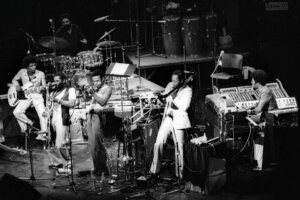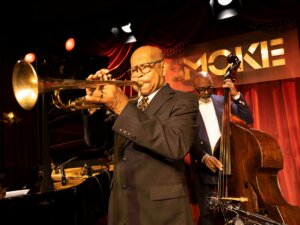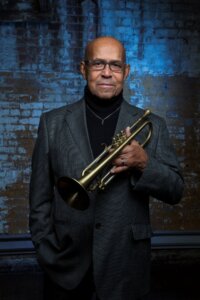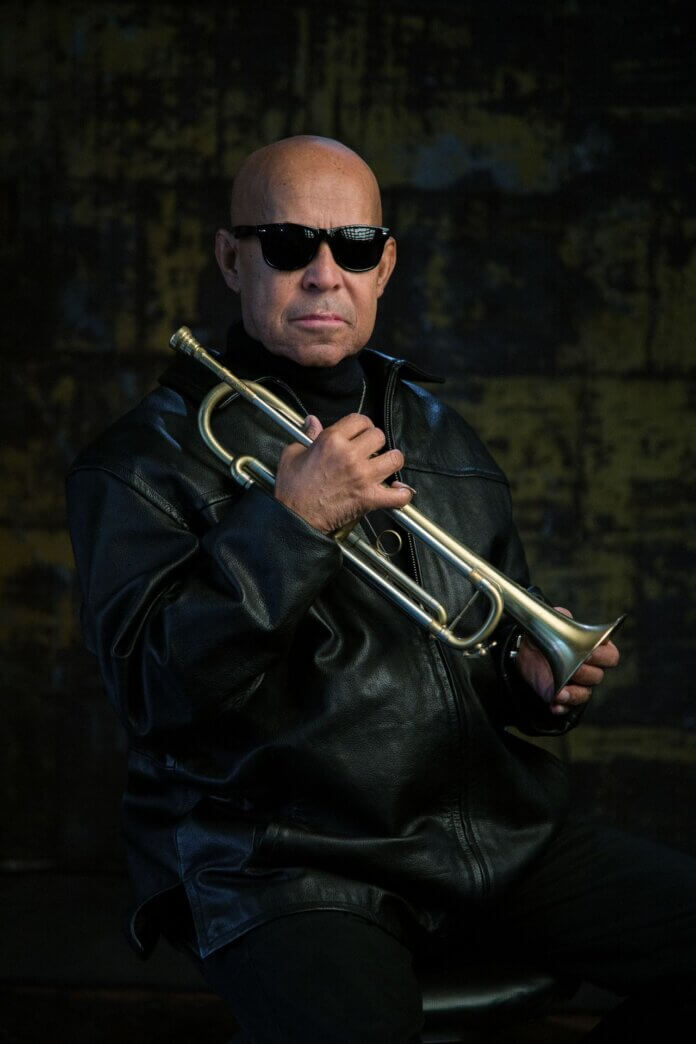In this interview we spoke with Dr. Henderson about his roots in the tradition, his experiences alongside legends, and his perspective on the present and future of the music he continues to serve with heart and integrity.

Dr. Henderson, your relationship with the tradition is unique. How did it begin?
Unbelievably, my very first teacher was Louis Armstrong. My mother worked in show business—she danced at the Cotton Club with her twin sister in a duo called The Brown Twins—and knew all the major artists of that time. When I was nine, she took me to see Louis live. I remember that concert vividly, even if I didn’t yet understand who I was watching.
A year later, she introduced me to him. I played something for him, and he was impressed. He gave me a book of transcriptions. I was ten years old and had no idea what a giant I was standing in front of. Later on, my stepfather, a physician whose patients included Miles Davis, John Coltrane, Billie Holiday, and Duke Ellington, introduced me to Miles. Miles became a regular presence in our home, and when I was still in high school, he started taking me to his concerts. I remember hearing Coltrane, Cannonball Adderley, Wynton Kelly, Paul Chambers, and Philly Joe Jones. That was it—I knew that was what I wanted to do with my life. I must have been 19. The year was probably 1958.
You later joined one of the most visionary groups of the era—Herbie Hancock’s Mwandishi.
That was the turning point. I played with Herbie from 1970 to 1973. It was my first major gig, and it changed my life. We were exploring something new—electric textures, open forms, spiritual connections. That experience shaped everything I did afterward.
You have visited Italy often over the years. What memories do you have of it?
I’ve played all over Italy and have many fond memories – especially of dear Marco Tamburini. He was a wonderful trumpeter and a close friend. I also worked with Piero Odorici, Massimo Manzi, Paolo Pellegatti… it’s been a while, but I used to come at least twice a year between the late ’80s and early 2000s.
Do you think there’s a necessary relationship between art and marketing?
They should go hand in hand. Artists deserve to be compensated. But often, the opposite is true. Many of us are so immersed in the creative side that we never learn the rudiments of marketing. I’m only starting to understand some of that now. The business side of music is a separate world. When I was coming up, the best players got the gigs. Today, it’s about image—how you look, how old you are. If you’re not a “young lion,” you’re often excluded. But for me, music is music. Quality is what matters. Always.
Who were your greatest influences – on trumpet and as a composer?
Miles Davis, first and foremost. I listened to all his records. I tried to sound like him. Then I discovered Lee Morgan, Freddie Hubbard, Woody Shaw, and Booker Little. Each of them shaped my voice.
As a composer, I’ve always admired Miles’s approach. He didn’t write many pieces, but what he did write left space for the musicians to paint their own picture. His music was never self-centered. That’s something I’ve inherited from him. When I compose, I think of it as a collective act—every player adds something personal.
As an elder statesman of the music, how do you see the state of jazz today?
It’s alive and well. I teach at the conservatory and see so many gifted young musicians coming up. My role is to act as a coach. I stress the importance of knowing where the music comes from. If you’re a trumpeter, you must study Armstrong, Miles, Dizzy. If you play saxophone, you have to study Bird. Tradition is essential. But you also need to understand that the world is evolving—and so is the music. That’s healthy.
We’ve lost some towering figures recently – Quincy Jones, Lou Donaldson, Roy Haynes. Do you feel the music is fading with them?
Not at all. Before them, we lost Armstrong, Billie Holiday, Coltrane, Bird. Did the music stop? No—it continued. Every generation has its heroes. When one passes, someone else rises. That’s life. That’s music. It doesn’t stop.

Are there any artists today who you consider true giants?
To be honest, no one today compares to Miles, Cannonball, McCoy Tyner, Joe Henderson, Dexter Gordon. Those were once-in-a-lifetime voices. But that’s not to say there isn’t talent. The world is changing—sometimes for better, sometimes for worse—and the music reflects that. We’ll have to see how future generations interpret it. We may not be around to hear it, but it’s coming.
If there is such a thing, what do you think is the boundary between a man’s life and his art?
That’s a tough one. Life is finite. Art isn’t.
If you could have been another musician from the past, who would it be?
John Coltrane. He opened me to a universe of spiritual depth. His music was transformative.
Do you see composition and improvisation as separate?
Not really. Right now, as I speak to you, I’m improvising. If I wrote this down, it would become fixed. But every time I play a solo, I’m composing. So yes, to me, they’re one and the same.
You mentioned spirituality. How central is it to your music and life?
It’s everything. I believe in a higher force—some call it God, Allah, Buddha. I don’t get caught up in names. But I believe this force created the universe. The more I understand that, the more I try to express it through music. The person who understood this best was Coltrane. He made spirituality audible.
Have you had disappointments, or do you feel fulfilled?
I feel extremely fortunate. I’ve played with almost everyone I admired. Herbie Hancock opened that door for me, and from there I was able to meet and work with so many legends. No disappointments—only hopes. Mainly, I hope to stay healthy so I can keep doing this for a while longer.
What does “success” mean to a jazz musician?
Beyond money, it’s knowing you gave everything to leave your mark.

What do you think about the term BAM—Black American Music—as an alternative label for jazz?
I’m not big on labels. Call it what you like—Black music, African-American classical music—what matters is whether you can play it.
Let me give you three names: Booker Little, Louis Armstrong, Woody Shaw. Who influenced you most?
Booker Little, without a doubt. His sound, his control, his advanced ideas—even though he died so young. I never had the chance to meet him, but he left a deep impression. I loved the others too—and I was lucky enough to know them well.
Last question: Freud, Klein, Jung. Which had the greatest impact on your work in psychiatry?
(smiles) They all contributed something essential. It depends on the patient, the situation. Each one offered a lens into the human mind—and the trick is knowing which one to use, and when.
